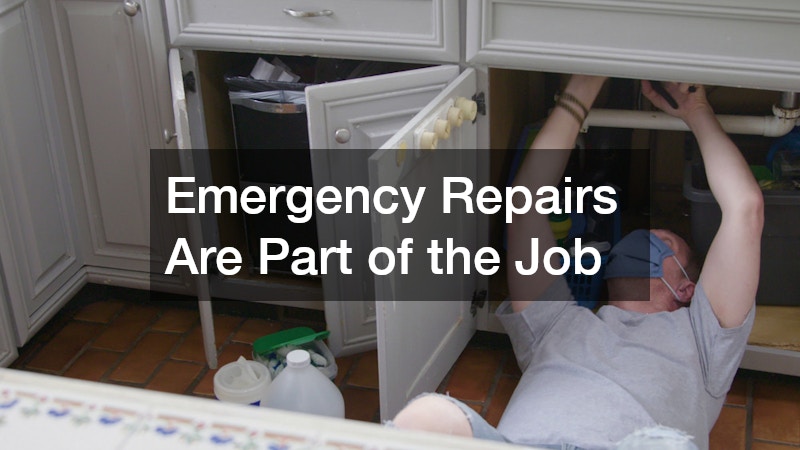Plumbers are skilled tradespeople whose work is crucial in maintaining the infrastructure of our homes and businesses. Their daily tasks can vary widely, from installing fresh plumbing systems to repairing existing water and waste systems. While most people recognize plumbers primarily for fixing leaky pipes, their roles and responsibilities extend far beyond that. This blog post explores the day-to-day activities of plumbers, showcasing the diverse nature of their profession and why they are an essential service in our society.
Installation of Plumbing Systems
One of the primary functions of a plumber is the installation of new plumbing systems. This can occur in new construction or during major renovations. Plumbers often work closely with builders and architects to ensure that the plumbing systems are installed according to local codes and regulations. They are responsible for selecting the appropriate materials and ensuring that the system is designed to operate efficiently. By installing well-planned plumbing systems, plumbers help to reduce future maintenance costs and enhance the overall functionality of the property.
Routine Maintenance and Inspections
Plumbers also perform routine maintenance and inspections on existing plumbing systems. Regular check-ups are vital to identifying potential issues before they escalate into major problems. This includes checking for leaks, assessing the condition of pipes, and ensuring that water pressure is adequate. One crucial part of this role involves working with tools and technology, such as specialized cameras, that allow plumbers to inspect the insides of pipes without extensive excavation. This preventative approach can save homeowners significant costs in the long run by catching trouble before it becomes a larger headache.
Emergency Repairs
When it comes to plumbing, emergencies can happen at any time, and plumbers must be ready to respond swiftly. Common emergencies include burst pipes, sewage backups, and broken water heaters. On an average day, a plumber might receive numerous calls for urgent repairs, requiring them to think on their feet and act quickly. In many instances, their expertise in diagnosing problems quickly can make all the difference in minimizing damage to a property. Being a plumber means having the skills and knowledge to address these urgent situations while maintaining a calm and professional demeanor.
Customer Interaction and Education
In addition to the technical aspects of their job, plumbers also spend a significant amount of time interacting with customers. Whether it’s a home or a commercial establishment, communicating effectively is crucial. A good plumber must explain problems clearly and provide options for repairs or upgrades. They also educate customers on proper maintenance practices, helping them understand how to care for their plumbing systems proactively. This interaction builds trust and forms long-term relationships, making customers more likely to call back for future services or recommend plumbers to others.
Adapting to New Technologies
As technology evolves, so do the tools and techniques that plumbers use daily. Many modern plumbers utilize advanced diagnostics and equipment to improve their efficiency and accuracy. For example, trenchless technology allows plumbers to repair underground pipes without the need for extensive digging, reducing disruption for clients. Staying updated with industry trends is essential for plumbers, as it not only enhances service delivery but also sets them apart in a competitive field. By embracing new technology, plumbers not only increase their effectiveness but also provide clients with innovative solutions that can save time and money.
The daily life of a plumber is diverse and multifaceted, encompassing installation, maintenance, emergency repairs, and customer relations. Each day brings its own set of challenges, requiring plumbers to be highly skilled, adaptable, and customer-centered. Whether they’re navigating complex plumbing systems in new buildings or addressing urgent leaks, their work is vital in maintaining the flow of everyday life. A well-running plumbing system is essential for both homes and businesses, and it is thanks to plumbers that these systems operate smoothly. Understanding the breadth of a plumber’s day-to-day responsibilities can deepen our appreciation for the essential services they provide.
What Do Plumbers Do Day to Day?
Plumbers are skilled tradespeople whose work is crucial in maintaining the infrastructure of our homes and businesses. Their daily tasks can vary widely, from installing fresh plumbing systems to repairing existing water and waste systems. While most people recognize plumbers primarily for fixing leaky pipes, their roles and responsibilities extend far beyond that. This blog post explores the day-to-day activities of plumbers, showcasing the diverse nature of their profession and why they are an essential service in our society.
Installation of Plumbing Systems
One of the primary functions of a plumber is the installation of new plumbing systems. This can occur in new construction or during major renovations. Plumbers often work closely with builders and architects to ensure that the plumbing systems are installed according to local codes and regulations. They are responsible for selecting the appropriate materials and ensuring that the system is designed to operate efficiently. By installing well-planned plumbing systems, plumbers help to reduce future maintenance costs and enhance the overall functionality of the property.
Routine Maintenance and Inspections
Plumbers also perform routine maintenance and inspections on existing plumbing systems. Regular check-ups are vital to identifying potential issues before they escalate into major problems. This includes checking for leaks, assessing the condition of pipes, and ensuring that water pressure is adequate. One crucial part of this role involves working with tools and technology, such as specialized cameras, that allow plumbers to inspect the insides of pipes without extensive excavation. This preventative approach can save homeowners significant costs in the long run by catching trouble before it becomes a larger headache.
Emergency Repairs
When it comes to plumbing, emergencies can happen at any time, and plumbers must be ready to respond swiftly. Common emergencies include burst pipes, sewage backups, and broken water heaters. On an average day, a plumber might receive numerous calls for urgent repairs, requiring them to think on their feet and act quickly. In many instances, their expertise in diagnosing problems quickly can make all the difference in minimizing damage to a property. Being a plumber means having the skills and knowledge to address these urgent situations while maintaining a calm and professional demeanor.
Customer Interaction and Education
In addition to the technical aspects of their job, plumbers also spend a significant amount of time interacting with customers. Whether it’s a home or a commercial establishment, communicating effectively is crucial. A good plumber must explain problems clearly and provide options for repairs or upgrades. They also educate customers on proper maintenance practices, helping them understand how to care for their plumbing systems proactively. This interaction builds trust and forms long-term relationships, making customers more likely to call back for future services or recommend plumbers to others.
Adapting to New Technologies
As technology evolves, so do the tools and techniques that plumbers use daily. Many modern plumbers utilize advanced diagnostics and equipment to improve their efficiency and accuracy. For example, trenchless technology allows plumbers to repair underground pipes without the need for extensive digging, reducing disruption for clients. Staying updated with industry trends is essential for plumbers, as it not only enhances service delivery but also sets them apart in a competitive field. By embracing new technology, plumbers not only increase their effectiveness but also provide clients with innovative solutions that can save time and money.
Conclusion
The daily life of a plumber is diverse and multifaceted, encompassing installation, maintenance, emergency repairs, and customer relations. Each day brings its own set of challenges, requiring plumbers to be highly skilled, adaptable, and customer-centered. Whether they’re navigating complex plumbing systems in new buildings or addressing urgent leaks, their work is vital in maintaining the flow of everyday life. A well-running plumbing system is essential for both homes and businesses, and it is thanks to plumbers that these systems operate smoothly. Understanding the breadth of a plumberandrsquo;s day-to-day responsibilities can deepen our appreciation for the essential services they provide.

